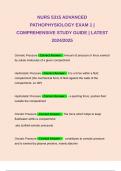NURS 5315 ADVANCED
PATHOPHYSIOLOGY EXAM 1 |
COMPREHENSIVE STUDY GUIDE | LATEST
2024/2025
Osmotic Pressure - Correct Answer - Amount of pressure or force exerted
by solute molecules of a given compartment
Hydrostatic Pressure - Correct Answer - It is a force within a fluid
compartment (the mechanical force of fluid against the walls of the
compartment, ex: BP)
Hydrostatic Pressure - Correct Answer - - a pushing force, pushes fluid
outside the compartment
Oncotic Pressure - Correct Answer - The force which helps to keep
fluid/water within a compartment
aka (colloid osmotic pressure)
Oncotic Pressure - Correct Answer - - contributes to osmotic pressure
and is exerted by plasma proteins, mainly albumin
,Oncotic Pressure - Correct Answer - In conditions where plasma proteins
are reduced, e.g. from being lost in the urine or from malnutrition, there will
be a reduction in oncotic pressure resulting in excess fluid buildup in the
tissues (edema).
Effective Arterial Blood Volume (EABV) - Correct Answer - Amount of
blood within the arterial space which effectively perfuses the organs and
tissues
ECF, EABV - Correct Answer - - volume changes in the ____
compartment will cause changes in the _____ in the same direction
Decreased arterial pressure - Correct Answer - Acts as a potent stimulus
to ADH secretion even in the presence of hypo-osmolality.
ADH - Correct Answer - It plays an important role in homeostasis by
regulation of water, glucose and salt in the blood. It is released when body
is dehydrated; secreted by the pituitary gland in response to a water deficit,
Na excess or low BP; It causes the kidneys to reabsorb water, thus
increasing plasma volume
,Aldosterone - Correct Answer - hormone secreted from the adrenal cortex
and increases renal Na resorption and K excretion
Renin Angiotensin Aldosterone System (RAAS) - Correct Answer - It is
activated by low blood volume. It regulates blood pressure and fluid
balance
Renin - Correct Answer - low blood volume triggers release
Natriuretic Hormones - Correct Answer - Hormones released from the
atria or ventricle of the heart.
Natriuretic Hormones - Correct Answer - It decreases blood volume by
promoting urine excretion of sodium and water (opposite of RAAS)
Natriuretic peptides - Correct Answer - Have been found to be useful
markers in differentiating patients presenting with acute onset of
breathlessness and also as prognostic markers in patients with congestive
cardiac failure.
Fluid Volume Deficit Etiology - Correct Answer - Trauma, dehydration,
increased output, decreased intake, burn, sepsis, DKA, gastroenteritis,
diabetes insipidus
, Fluid Volume Deficit S/S - Correct Answer - Hypotension, decreased skin
turgor, dry mucous membrane, sudden weight loss, weak, rapid pulse,
change in mental status, decreased urine output, hypovolemic shock.
Fluid Volume Deficit Pathophysiology - Correct Answer - Results from
loss of body fluids from ICF and ECF
Fluid Volume Excess - Correct Answer - occurs when fluid intake of fluid
retention exceeds the bodies fluid needs
Fluid Volume Excess Etiology - Correct Answer - CHF, Hepatic failure,
renal failure, low protein sources, nephrotic syndrome, corticosteroids, liver
cirrhosis
Fluid Volume Excess Pathophysiology - Correct Answer - It is due to
shifts in fluid from interstium to plasma, reduce excretion of sodium and
water, excessive retention of sodium and water from chronic renal stimuli.
Fluid Volume Excess - Correct Answer - S/S edema, tightness of the skin,
puffiness of eyes, rales




